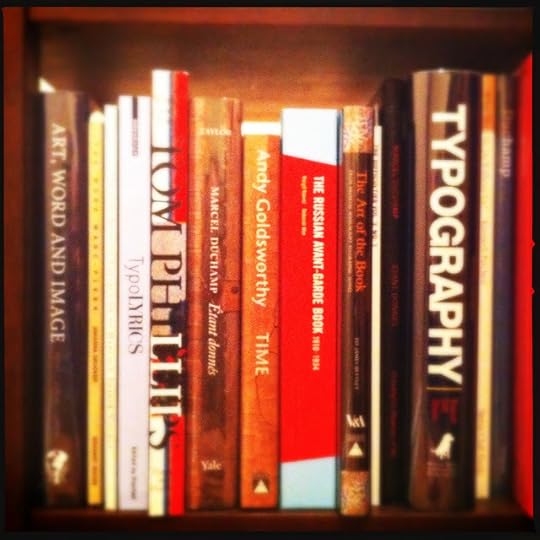The Great Unread

I am sitting in a small room with a tiny percentage of my books. Even after donating away about 2,200 books last month, I'm sure I still have at least one and a half times that number left, and maybe double.
As I was looking throw the three small bookshelves here for a tiny book by Jonathan Jones (apri'll) and not finding it, I realized that I would probably not ever finish reading these books of mine. They would surround me, but they would not be inside me. Or not completely. I will have skimmed them, or flipped through them. I will have read a chapter or two, or looked a fact up in them. Yet I still will have become them.
These books, even unread, define me. Take one shelf, and you'll see that I am interested in the typographic, the visual, the poetic, the conceptual. You will already see, from this small sidetable's holdings, that I am a visual poet (or, less likely, one of those very rare few who enjoy visual poetry yet never create any).
While looking through the shelves, I noticed that two books were shelved upside down, something I simply never recall having done before. But there they were: Jackson Mac Low's Representative Works: 1938-1985 and Michael Harney's The Harney & Sons Guide to Tea were resting on their heads. They would they saw was in some ways backwards, but in other ways just right given the place where they live, a place overwhelmed by poetry, but accepting others in as well, along with art supplies, clean clear bottles that used to hold scotch, the beginnings of sculptural visual poems, or just the pieces for them.
Oh, there are books I've read sitting around me as well, but this is primarily a selection of books I intend to read relatively soon, probably about 250 of them, but maybe more. I have brought them around me, brought them close, so that they might keep me warm with their thoughts, even if I haven't allowed those thoughts to penetrate me yet. And I have not penetrated them myself.
Because reading is an interpenetration. A physical penetration (but also intellectual) of the book by the reader. An intellectual penetration of the reader by the book.
Yet we will all die, soon enough, without having read so many score of the books we had intended to read. Still, we feel somehow increased by them. It is strange, sometimes, to think of the books I've never read. For instance, Moby-Dick, yet I feel something of the book, I've picked up pieces of it. (Read all the encyclopedic matter in it once in Ghana, read the Classics Illustrated comic book version as a child in Barbados, and I've seen so many famous and unknown illustrations of it—but I've never seen a movie version.) We are increased even by what we only tangentially experience.
Tangenitally.
It is all about penetration, and degrees of penetration. What we learn about it, and how deeply we learn. But having that unread book is important.
A friend of mine believes that the most potent review is the review of silence, a total lack of response. She says that that silence speaks of a deep inability to like and, therefore, to respond to the author of a work. She claims that silence means the book, the poem, the story has not been loved. But I don't believe that.
First, I realize that some books go years without being read, even books on my shelves. Then one day seems, for unknown reasons, the day to read that book, and when I read it I am exalted. It is at least possible that I know the unread books well enough to know when it feels right to read that book, and then I find myself in the perfect frame of mind to enjoy the book.
A frame of mind is a frame of reference. It controls the book as much as the book's contents do.
So some people don't respond because they have not had time to read the book.
Second, sometimes people find it difficult to respond to a book. I have found myself loving a book, found myself constructing a review in my head, and then never writing the review because the time doesn't feel right, because I'm tired, because I feel empty of useful sequences of words. And I write more than most people, and probably with more ease. Yet response is hard.
Even if the books gives in to you, gives itself over to you, gives everything of itself to you, you still have the requirement of a personal response, one that fits the time, the place, and one that fits the response the book is giving you.
Interpenetration. You have to give to get.
Or we never read a book. We merely read versions of ourselves.
I'm thinking of this, having tried to find a little book I thought I was ready to respond to, one I loved, one I'd never forgotten, one that I'd planned to respond to tonight, one that I've lost, however temporarily. Yet, no matter how temporary that loss is, I feel it like a void inside me.
Because I want to respond, because I want people to know when their work moves me, because I feel a responsibility to respond. Because even the least of us writers, those who work in the small time that I do, they have voices, and when they yell them into a canyon they want to hear the voice, somehow changed, and somehow reassuring and different from the original, echoing back.
For the book is the voice yelled out, and the echo is the reader responding.
ecr. l'inf.
Published on January 07, 2012 19:45
No comments have been added yet.



